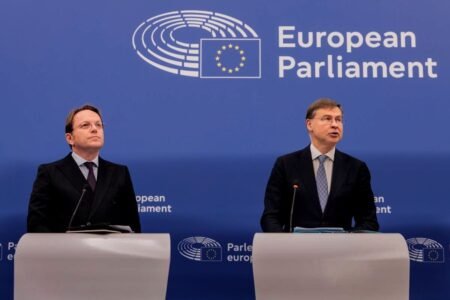The EU Council adopted the Regulations on the veterinary medicinal products and medicated feed on 26 November.
Advertisement
Why did the Commission propose these new legislations?
The regulatory framework for veterinary medicinal products (VMPs) needed to be adapted to scientific progress and to the current market conditions and economic reality, while continuing to ensure a high level of protection of animal health and welfare, safeguarding public health and protecting the environment.
At the same time rules concerning medicated feed have a significant influence on the keeping and rearing of animals (including non-food-producing animals) and on the production of products of animal origin. Further measures were warranted to strengthen the effective functioning of the internal market and to explicitly provide the possibility to treat non-food-producing animals with medicated feed.
In this context, the main objectives of the new legislations are to:
- provide for a modern, innovative and fit for purpose legal framework on VMPs,
- give incentives to stimulate innovation for VMPs and increase their availability,
- strengthen the EU action to fight antimicrobial resistance,
- ensure economically-viable production of safe medicated feed,
- foster innovation in the oral routes of VMP administration, particularly medicated pet food.
What has been adopted today?
After 4 years of negotiations, the Regulations adopted by the Council today, following a positive vote in the European Parliament on 25 October, will strengthen the EU action in fighting antimicrobial resistance (AMR), which is a global threat to public health.
They reflect the priorities laid down in the European One Health action plan against AMR adopted in June 2017 by the European Commission, which pursues the “One Health” approach (recognising the interconnection between human health, animal health and the environment).
The main achievement of the new EU legislations on VMPs and medicated feed in this respect is that they lay down a wide range of concrete measures to fight AMR and to promote a prudent and responsible use of antimicrobials, following the “One Health” approach.
Such measures, applying to EU Member States, include:
- a ban on the preventive use of antibiotics in groups of animals,
- a ban on the preventive use of antimicrobials via medicated feed,
- restrictions on metaphylactic use of antimicrobials (control treatment preventing a further spread of infection),
- a reinforced ban on the use of antimicrobials for promoting growth and increasing yield (in addition to the 2006 prohibition of using antibiotics as growth promoters in feed),
- the possibility to reserve certain antimicrobials for humans only,
- the obligation for Member States to collect data on the sale and use of antimicrobials.
- science-based maximum limits for cross contamination of feed with antimicrobials,
- various measures aiming at prudent and responsible use of antimicrobials.
In addition, for their exports into the EU, non-EU countries will have to respect the ban on antimicrobials for promoting growth and increasing yield, as well as the restrictions on antimicrobials designated as reserved for human use in the EU. Thereby the new legislation improves the protection of European consumers against the risk of AMR spread through imports of animals or of products of animal origin.
A second important achievement, through the new legislation on VMPs, is the promotion of availability of veterinary medicines by stimulating innovation and competitiveness.
As an example, the new VMP Regulation provides for a simplified assessment procedure and a data protection period, which may be extended up to 18 years under certain conditions. Such provisions intend to stimulate the development of new antimicrobial VMPs, as well as the development of new VMPs for rare diseases and for so-called ‘minor species’ such as bees (in opposition to major food-producing species and major companion animal species).
Another example is the setting of a clear definition and of adequate rules for biological VMPs and novel therapy VMPs, which will also incentivise the emergence of new VMPs in those areas.
Finally, opening up the centralised authorisation procedure to any VMP and allowing for exceptional circumstances marketing authorisations will positively broaden the spectrum of VMPs which may be brought to the market.
A third real achievement, through the new legislation on VMPs, is the establishment of a modern, innovative and fit for purpose legal framework for VMPs. Bringing autologous vaccines in the scope of the Regulation, specifying clear and fully harmonised labelling requirements, adopting a simpler system for variation decisions and the risk-based approach for pharmacovigilance and controls are among the key measures allowing for such progress.
A fourth essential achievement, through the new legislation on medicated feed, is the establishment of new rules, which will ensure an economically-viable production of safe medicated feed throughout the EU. Apart from the harmonisation of the manufacturing standards of medicated feed, the Regulation allows the production in feed mills, mobile mixing, on-farm mixing and anticipated production and thus the choice for the best option according to the respective local conditions. Moreover, the medicated feed rules fosterinnovationin medicated pet food as they create provisions concerning production, prescription and distribution of medicated feed for pets, which for example allows for pet owners to treat their chronically diseased animals with their regular feed whereas currently these pets need to be treated with pills or pastes.
Who will benefit from the new rules?
A broad range of actors will benefit from the revised legislation on veterinary medicines and medicated feed, among which animals, farmers, pet owners, veterinarians, pharmaceutical companies and other businesses. But more generally every citizen will gain from this new legislation, especially through the measures to fight antimicrobial resistance, where the existence of links between human health, animal health and the environment has been established.
For animals, the benefit will come from the increased number and quality of medicines available to treat them, as well as from an appropriate use of those medicines whenever they are antimicrobials.
Thanks to the new legislations, veterinarians, farmers and pet owners should have better access to veterinary medicines to treat animals.
Human health is expected to benefit from these legislations, notably through rules aiming at keeping antimicrobials (including antibiotics) effective. Based on a recent study published in the Lancet, infections with antibiotic-resistant bacteria have caused an estimated 33 000 deaths in 2015 in the EU and the European Economic Area.
Pharmaceutical companies will benefit from an enlarged use of the centralised authorisation procedure and a reduction of administrative burden.
Other businesses such as suppliers of VMPs and manufacturers of medicated feed will benefit from an improved competition, an improved circulation of VMPs and medicated feed across the EU. The strengthened functioning of the internal market, combined with enhanced innovation, will contribute to creating more growth and jobs in the EU.
In addition,the mandatory environmental risk assessment for new VMP authorisations should help better preserve the environment.
How will the new legislation help to tackle antimicrobial resistance (AMR)?
It is expected that the new rules on VMP and medicated feed will meaningfully contribute to reducing the use of antimicrobials among animals, through the concrete measures promoting their responsible and prudent use, as explained further above. This is one of the main ambitions of the European One Health Action Plan against AMR, adopted by the European Commission in June 2017.
Today in the EU, the majority of antimicrobials are consumed by animals, according to the 2017 JIACRA report. The obligation for EU Member States to collect data on sales and use of veterinary antimicrobials, set in the new legislation, will therefore play an essential role in monitoring the actual consumption of antimicrobials in the EU and thereby help better address antimicrobial resistance.
By applying the new rules also on imported animals and products, the legislation will also have an impact on the EU’s global role in fighting AMR. Of 130 countries recently assessed worldwide by the Word Animal Health Organization (OIE), more than 85% have no legislation for the import, manufacture, distribution and/or use of veterinary medicines, including antimicrobial agents (2016 OIE Annual report on the use of antimicrobial agents in animals).
How do the AMR-related import conditions for animals and animal products comply with the World Trade Organisation (WTO) rules?
With new EU Regulations on veterinary medicines and on medicated feed much stricter rules will apply to operators in the EU than to operators in non-EU countries, in particular the very tight rules on prophylaxis and metaphylaxis. Therefore the new import provisions should not be seen as a trade barrier but really as a part of the overall fight against AMR, recognising that AMR does not respect borders.
The Commission will lay down detailed rules on how to apply the import provisions through a delegated act, which shall be compatible with international agreements (including WTO obligations), legally sound, proportionate, non-discriminatory and based on scientific evidence. The Commission is proactively engaging with non-EU countries to inform them about these new import provisions. They were notably presented at the Sanitary and Phytosanitary Committee of the WTO in July 2018.
When will the new rules be applicable?
The date of application of the new VMP and Medicated Feed Regulations will be three years after they enter into force (end of 2018/early 2019). In the meantime, a set of additional legal acts will be adopted to complement and/or support specific aspects of the legislation.
Source: European Commission







